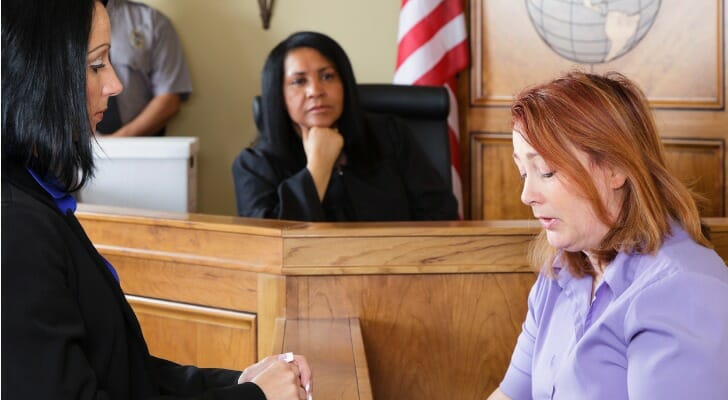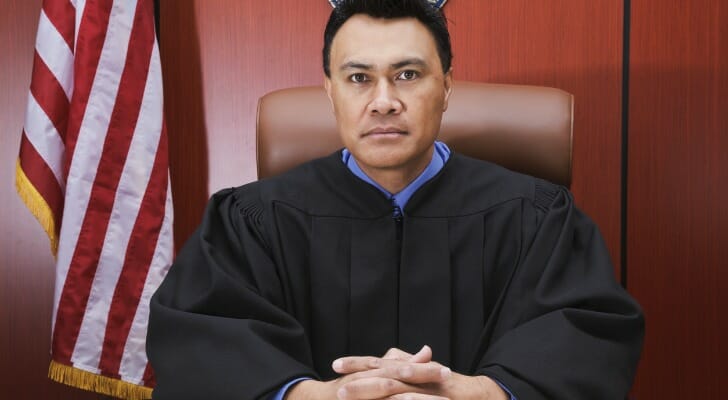A probate judge is an official of the county court system and a judicial official of the state who decides civil court cases that involve the probate process. Probate is the process of proving wills for those who have died with one (testate cases). A probate judge also oversees cases where a will has not been prepared by a deceased person (intestate cases). Most probate issues are decided on a county basis. Probate judges may have other duties depending on state and county laws. They may decide competency and guardianship cases. In some states, they decide adoption cases. The primary responsibility of a probate judge, however, is dealing with estates.
Working with a financial advisor can help insure that your estate plans will be executed as efficiently and correctly as possible.
What Is Probate?
Probate is the process of closing the estate of a person upon his death. If the person died testate, that means he died with a last will and testament. In this case, probate is the process of proving that the will is valid, paying the bills associated with the estate, paying taxes and distributing property to the heirs. If the person died intestate, he died with no will. In this case, probate is more difficult and requires more involvement from the probate judge. If you leave a last will and testament upon your death, you will greatly reduce the burden on your heirs who will be grieving and trying to navigate probate.
Probate Judge Role in Testate Proceedings
If the deceased person (decedent) left a will and no beneficiary steps up to contest it, the role of a probate judge is fairly minor but significant. If you have to enter probate, here are the general steps. Laws vary from state to state and even jurisdiction to jurisdiction:
- Open a Probate Case With the Court – The executor of the estate of the decedent files the will with the probate court. The role of the probate court is to prove the will is legal. The probate judge makes sure that no one has any objections to the will. For example, a possible beneficiary could say that the decedent was coerced into making the will. Also, the beneficiaries of the will could disagree on what is inherited. In the worst-case scenario, the judge might have to declare it a case with a contested will. If there are no objections to the will, then the executor stated the will is approved and an estate bank account is opened.
- Notify Interested Parties – The executor will place notices in newspapers to creditors of the decedent. Parties interested in a decedent’s will would be any possible heirs and all creditors. They are all notified if they can be found. If they cannot be found, then newspaper notices have to suffice. Creditors have a specified time period, usually six to nine months, to submit claims against the estate to the probate court.
- Taking Inventory of the Assets of the Estate – The executor has to inventory the estate and state the amount that individual assets were worth on the date of the decedent’s death. Both financial assets and physical assets have to be inventoried. Then, the inventory is filed with the probate judge and the heirs. Taking an inventory of the estate can be a lot of work and time-consuming. You may have to sell physical property like a home. You want to close any and all stock and bond positions. Usually, executors are compensated for this work either through inheriting themselves or by a statement in the will concerning their compensation. Often, executors hire a probate attorney for assistance especially if the estate is very large.
- Distribution of Assets – After the inventory, the probate judge authorizes the distribution of assets except in the case of a contested will. At this point, the debts of managing the estate, creditor’s debts and minor children and their inheritance would be taken up. All debts are paid from the estate even if assets have to be sold to pay them. Then, accounts with a beneficiary such as retirement accounts or life insurance policies would be liquidated and distributed to the appropriate beneficiary.
- Terminate the Estate – After everything is distributed to the heirs, the probate judge makes sure all creditors have been paid and closes the estate. It remains a public record.
Probate Judge Role in Intestate Proceedings

If a person dies intestate, that is, without a will, the same general steps are followed, but the process is more complicated and the probate judge has to be considerably more involved. The probate judge will appoint an administrator, or executor, of the estate who will inventory the estate and post notices for interested parties. If no will can be found, the judge will invoke the law of intestate succession which states, for each state, the order in which the decedent’s next of kin can inherit. Any assets will be distributed and the estate closed.
Probate Judge Role in Will Contests
If the will is contested by one or more heirs, the role of the probate judge becomes more significant and is very involved. The probate judge reviews the evidence and listens to the arguments of the heirs who are contesting. This process – which may include various types of discovery, numerous hearings, various motions and responses to motions – can take years and entail significant attorney fees. At some point, the judge will issue rulings and opinions. The authority to settle a contested will is the judge. If there is more than one will discovered or two beneficiaries claim the same property, along with many other examples, the judge decides the cases.
The Bottom Line

The role of a probate judge varies between jurisdictions but is similar in most cases. If an estate is straightforward and there is a clear will, then the role of the judge is minimal unless the will is contested by one or more of the possible heirs. In that case, the judge has to hear evidence and rule on the distribution of assets between the heirs. If a person dies intestate, then the judge is also involved in appointing an administrator and serving as an advisor to that administrator. When the will is finally sorted out, which may take time, the judge will make the rulings and oversee the distribution of property. Probate judges may serve in other capacities along with their probate duties.
Tips for Estate Planning
- There are some basic points you need to cover when you write a will. It might be best to talk with a financial advisor. Finding one doesn’t have to be hard. If you use SmartAsset’s financial advisor matching tool, you can find a financial advisor to your liking. If you’re ready, get started now.
- Inheritance laws and estate taxes differ by state. SmartAsset’s estate planning guide will be a source of help to you when planning your own estate.
- Knowing how much you will have when you retire is a key component of estate planning. A free retirement calculator can give you a good estimate of what your financial resources will be when you retire.
Photo credit: ©iStock.com/dcdebs, ©iStock.com/RichLegg, ©iStock.com/Marilyn Nieves
